would you like to...句型练习
Would you like to...?
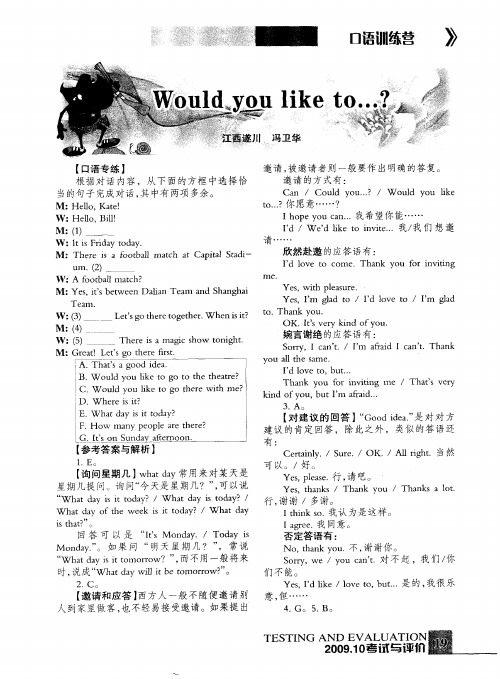
鲔
ki d o u, tIm fad . n fyo bu ' ar i ..
丞
掺
3 .A 。
【 对建议 的回答 】 G o e.是对对方 “ o di a d ” 建 议 的 肯定 回答 ,除 此之 外 , 类似 的答 语 还
有: C r i y ue et n lS r al {OK Al i t 当 { lr h g 可 以。/好 。
【 参考答案与解析 】
1 .E。
…
【 询问星期几】 ht a w a dy常用来对某天是
星 期几提 问。询 1“ 天是 星 期几? ” 可 以说 '今 4 ,
“ ha a si od y | W h td y i o y? | W td y i t t a ? a a s t da W ha a ft e w e k i i t da { W ha a td y o h e s t o y? td y
i t t”。 s ha?
Y spes. , 吧。 e, la 行 请 e
Ye t n s ha ks { Th nk yo { Th nk a l t a u a s o .
行, ,多 。 I hn . ikS 我认 为是这 样 。 t O
I ge. 同意。 re 我 a
,
回 答 可 以 是 “t n a./To a s ISMo dy ’ dy i
【 邀请和应答 】 西方人 一般不随便邀请别 意 , … … 但 人 到家里做 客 , 也不 轻 易接 受邀 请 。如 果提 出 4.G 。 5. 。 B
T ES I G A N D T N
2 0 0 0 91 与评 l . 考试 i 戳 _ l
would like用法
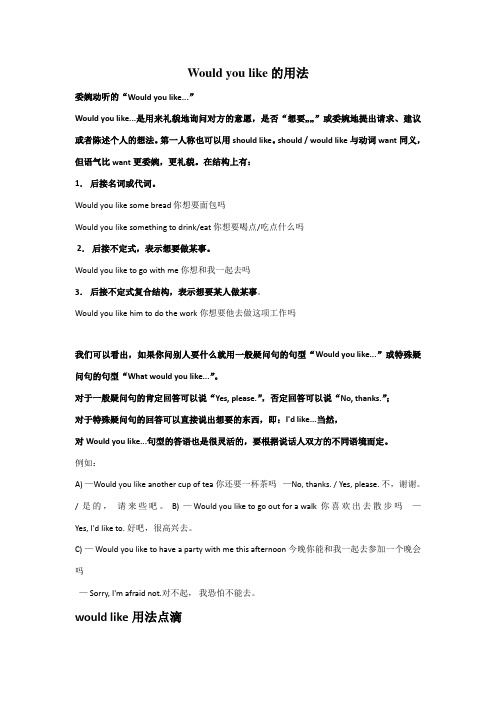
Would you like的用法委婉动听的“Would you like...”Would you like...是用来礼貌地询问对方的意愿,是否“想要……”或委婉地提出请求、建议或者陈述个人的想法。
第一人称也可以用should like。
should / would like与动词want同义,但语气比want更委婉,更礼貌。
在结构上有:1.后接名词或代词。
Would you like some bread 你想要面包吗Would you like something to drink/eat 你想要喝点/吃点什么吗2.后接不定式,表示想要做某事。
Would you like to go with me 你想和我一起去吗3.后接不定式复合结构,表示想要某人做某事。
Would you like him to do the work你想要他去做这项工作吗我们可以看出,如果你问别人要什么就用一般疑问句的句型“Would you like...”或特殊疑问句的句型“What would you like...”。
对于一般疑问句的肯定回答可以说“Yes, please.”,否定回答可以说“No, thanks.”;对于特殊疑问句的回答可以直接说出想要的东西,即:I'd like...当然,对Would you like...句型的答语也是很灵活的,要根据说话人双方的不同语境而定。
例如:A) —Would you like another cup of tea 你还要一杯茶吗—No, thanks. / Yes, please. 不,谢谢。
/ 是的,请来些吧。
B) —Would you like to go out for a walk 你喜欢出去散步吗—Yes, I'd like to. 好吧,很高兴去。
C) — Would you like to have a party with me this afternoon 今晚你能和我一起去参加一个晚会吗— Sorry, I'm afraid not.对不起,我恐怕不能去。
练习10 “Would you like…”等日常用语-七年级英语(仁爱版)(解析版)

练习10 “Would you like…?”等日常用语一、单项选择1.— Would you like some rice?—________. I’d like some fish.A.No, thanks. B.Yes, thank you. C.I’d love to.D.Yes, please.【答案】A【详解】句意:——你想要米饭吗?——不,谢谢了。
我想要一些鱼肉。
考查情景交际。
No, thanks.不,谢谢;Yes, thank you.好的,谢谢你;I’d lov e to.我想要;Yes, please.是的,好啊。
根据“I’d like some fish.”可知此处“不想要米饭”,用No, thanks. 故选A。
2.I’d like ________ chicken, but I don’t have ________ now.A.some; any B.any; some C.some; some D.any; any【答案】A【详解】句意:我想要一些鸡肉,但是我现在没有了。
考查不定代词。
some一些,用于肯定句;any任何,用于疑问句或否定句。
第一个空格所在句子是肯定句,用some。
第二个空格所在句子“don’t”是否定词,否定句中用any,故选A。
3.—Welcome to my home! What about ________ some milk?—Yes, pleaseA.drink B.drinking C.drinks D.to drink【答案】B【详解】句意:——欢迎来我家!喝点牛奶怎么样?——好的。
考查非谓语动词。
drink喝,是一个动词。
句中使用了句型what about …,意为“……怎么样”,表示提建议,后跟名词或动名词形式。
故选B。
4.—________ have some chicken?—Good idea.A.Would you like B.Do you like C.Why not D.What about【答案】C【详解】句意:——为什么不吃鸡肉呢?——好主意。
(完整版)Wouldlike的用法及练习

Would like 的用法同学们,你“想要”和would like交朋友吗?你知道如何用would like表达意愿吗?一、would like的基本用法短语would like用来表达意愿,意为“想要、愿意”,和want意思接近,但比want语气委婉、客气。
其后可接名词、代词宾格或动词不定式。
其中,would是情态动词,常可缩写为’d。
如:Lucy would like some eggs.露茜想要一些鸡蛋。
We’d like to watch TV after school.放学之后,我们想要看电视。
二、would like的固定句型1. W ould you like some …?你想要一些……吗?该句型常用于征求对方的意见。
肯定回答常用“Yes, please.”,而否定回答常用“No, thanks.”需要特别注意的是,在该句型中要用some,而不用any,以表示说话人希望得到肯定回答。
如:——Would you like some apples?你想要一些苹果吗?——Yes, please. 是的,我想要。
——No, thanks. 不,谢谢。
2. Would you like to … ? 你愿意去做……吗?该句型表示向对方有礼貌地提出建议或发出邀请,其中like可用love替换。
如:——Would you like/ love to play football with me?你想要和我一起踢足球吗?——Yes, I’d like / love to. 是的,我非常愿意。
——I’d like/ love to. But I’m too busy.我非常愿意,但我太忙了。
3. Would like to do sth. 想要做某事;Would like sb. to do sth. 想要某人去做某事。
如:He would like to go out for a walk.他想要出去散步。
wouldlike的详细用法

wouldlike的详细用法今日给大家带来would like的用法,快来一起学习吧,下面我就和大家共享,来观赏一下吧。
would like的用法一、would like的基本用法would like意为“想,想要”,与want意义相同,但语气更委婉。
would like可与任何人称连用,没有人称和数的变化,其后可接名词、代词宾格或动词不定式。
其中,would是情态动词,常可缩写为’d。
如:Lucy would like some eggs.露茜想要一些鸡蛋。
We’d like to watch TV after school.放学之后,我们想要看电视。
二、would like的固定句型1.Would you like some…? 你想要一些……吗?该句型常用于征求对方的意见。
确定回答常用“Yes,please.”,而否定回答常用“No,thanks.”需要特殊留意的是,在该句型中要用some,而不用any,以表示说话人盼望得到确定回答。
如:——Would you like some apples?你想要一些苹果吗?——Yes,please.是的,我想要。
——No,thanks.不,感谢。
2.Would you like to…?你情愿去做……吗?该句型表示向对方有礼貌地提出建议或发出邀请,其中like可用love替换。
如:——Wouldyoulike/lovetoplayfootballwithme?你想要和我一起踢足球吗?——Yes,I’dlike/loveto.是的,我特别情愿。
——I’dlike/loveto.ButI’mtoobusy.我特别情愿,但我太忙了。
3.Would like to do sth.想要做某事;Would like sb. to do sth.想要某人去做某事。
如:He would like to go out for a walk.他想要出去漫步。
Our parents would like us to study well.我们的父母想要我们好好学习。
一般疑问句的所有句子
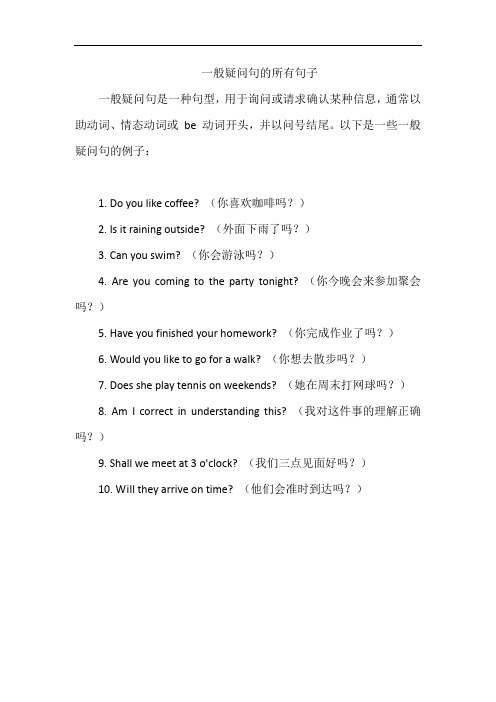
一般疑问句的所有句子
一般疑问句是一种句型,用于询问或请求确认某种信息,通常以助动词、情态动词或be 动词开头,并以问号结尾。
以下是一些一般疑问句的例子:
1. Do you like coffee? (你喜欢咖啡吗?)
2. Is it raining outside? (外面下雨了吗?)
3. Can you swim? (你会游泳吗?)
4. Are you coming to the party tonight? (你今晚会来参加聚会吗?)
5. Have you finished your homework? (你完成作业了吗?)
6. Would you like to go for a walk? (你想去散步吗?)
7. Does she play tennis on weekends? (她在周末打网球吗?)
8. Am I correct in understanding this? (我对这件事的理解正确吗?)
9. Shall we meet at 3 o'clock? (我们三点见面好吗?)
10. Will they arrive on time? (他们会准时到达吗?)。
提建议的英语句型及回答

提建议的英语句型及回答(一)提建议的表达1.Why don't you...?/Why not...?后接动词原形,意为“为什么不做……?”。
Why don't you talk to your parents?你为什么不和你的父母谈谈呢?Why not go to the movies with us?为什么不跟我们一起去看电影呢?2.What/How about后接名词/代词/动名词?意为“……怎么样?”。
What about watching TV?看电视怎么样?How about going shopping?去购物怎么样?3.Would you like sth.?意为“你想要某物吗?”。
Would you like some apples?你想要一些苹果吗?4.Would you like to do sth.?意为“你想做某事吗?”。
Would you like to play football with us?你想和我们一起踢足球吗?5.Let's do sth.意为“咱们做某事吧”。
Let's sing a song!咱们唱首歌吧!6.You should (not) do sth.意为“你(不)应该做某事”。
You shouldn't talk to your parents like this.你不应该这样对你父母说话。
7.You'd better (not) do sth.意为“你最好(不)做某事”。
You'd better call her at once.你最好马上给她打电话。
You'd better not go out.你最好不要出去。
8.Could you please (not) do sth.?意为“请你(不要)做某事好吗?”Could you please help me?请你帮帮我好吗?Could you please not smoke here?请你别在这里吸烟好吗?9.Would you mind (not) doing sth.?你介意(不)做某事吗?Would you mind closing the door?你介意关上门吗?10.Shall we/I...后接动词原形,意为“我们/我做……好吗?”。
would you like to do句型

"Would you like to do" 是一个常见的句型,用来表达邀请或建议做某事。
这个句型通常用于口语交流中,是一种礼貌且友好的表达方式。
下面是一些使用这个句型的例子:
"Would you like to go for a walk?" (你想去散步吗?)
"Would you like to have dinner with us?" (你想和我们一起吃饭吗?)
"Would you like to come to my house for a party?" (你想来我家参加聚会吗?)在这个句型中,"would" 是一个情态动词,表示询问或建议的语气。
后面跟着的动词要用原形形式,例如"to go", "to have", "to come" 等。
同时,这个句型也可以用来表达委婉的请求或建议,例如"Would you mind closing the window?" (请关上窗户好吗?)。
wouldlike的详细用法

wouldlike的详细用法今天给大家带来would like的用法,快来一起学习吧,下面就和大家分享,来欣赏一下吧。
would like的用法一、would like的基本用法would like意为“想,想要”,与want意义相同,但语气更委婉。
would like可与任何人称连用,没有人称和数的变化,其后可接名词、代词宾格或动词不定式。
其中,would是情态动词,常可缩写为’d。
如:Lucy would like some eggs.露茜想要一些鸡蛋。
We’d like to watch TV after school.放学之后,我们想要看电视。
二、would like的固定句型1.Would you like some…? 你想要一些……吗?该句型常用于征求对方的意见。
肯定回答常用“Yes,please.”,而否定回答常用“No,thanks.”需要特别注意的是,在该句型中要用some,而不用any,以表示说话人希望得到肯定回答。
如:——Would you like some apples?你想要一些苹果吗?——Yes,please.是的,我想要。
——No,thanks.不,谢谢。
2.Would you like to…?你愿意去做……吗?该句型表示向对方有礼貌地提出建议或发出邀请,其中like 可用love替换。
如:——Wouldyoulike/lovetoplayfootballwithme?你想要和我一起踢足球吗?——Yes,I’dlike/loveto.是的,我非常愿意。
——I’dlike/loveto.ButI’mtoobusy.我非常愿意,但我太忙了。
3.Would like to do sth.想要做某事;Would like sb. to do sth.想要某人去做某事。
如:He would like to go out for a walk.他想要出去散步。
Our parents would like us to study well.我们的父母想要我们好好学习。
Would you like…的口语用法

Would you like…的口语用法Would you like的口语用法1. 用于请人吃东西,意为:你要点吗? 你要来点吗?A:Would you like a cigarette? 抽支烟吗?B:No, thank you. 不抽,谢谢。
A:Would you like a cup of tea? 要来杯茶吗?B:Yes, please. Thanks. 好,来一杯吧,谢谢。
2. 用于提出邀请时征求对方意见,意为:你想吗? 你愿意做吗? 如:A:Would you like to go to the movies tonight? 你今晚想去看电影吗? B:Id like to. What time? 我很愿意,几点钟?A:Would you like to come with us? 你愿意同我们一起去吗?B:Im afraid I cant. I have some letters to write. 恐怕不行,我有几封信要写。
3. 用于询问对方是否需要某物或是否需要某人做某事等,意为:你需要吗? 如:A:Would you like some help? 你需要帮助吗?B:Yes, please. 是的,请帮我一把吧。
A:Would you like such a dictionary? 你想要那样一本词典吗?B:Yes, of course. 当要想要。
A:Would you like me to come along with you? 要我跟你一起去吗?B:Oh,thank you. Id rather go there alone. 噢,谢谢你,我想一个人去。
4. 有时可用于提出请求,意为:请你做好吗? 如:A:Would you like to clear the table? 请你收拾桌子行吗?B:Okay. 行。
注意有时这类表示请求的句子含有不满或厌烦之意:A:Would you like to turn that music down? 请你把音乐放小点行吗? B:Yes, sorry. 可以,对不起。
Would you like的用法
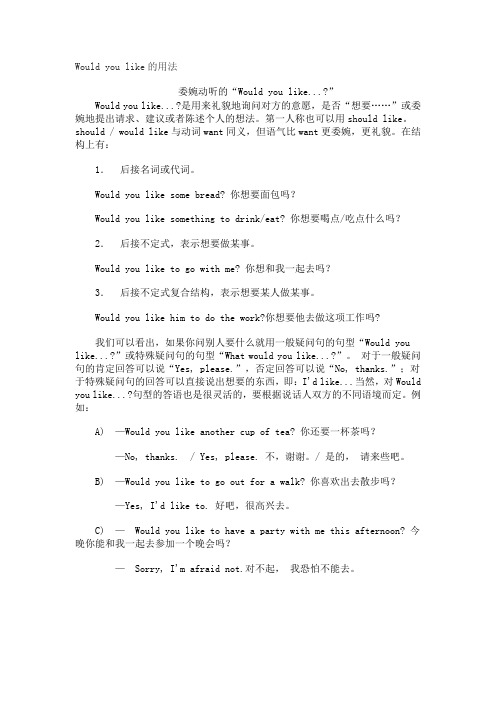
Would you like的用法委婉动听的“Would you like...?”Would you like...?是用来礼貌地询问对方的意愿,是否“想要……”或委婉地提出请求、建议或者陈述个人的想法。
第一人称也可以用should like。
should / would like与动词want同义,但语气比want更委婉,更礼貌。
在结构上有:1.后接名词或代词。
Would you like some bread? 你想要面包吗?Would you like something to drink/eat? 你想要喝点/吃点什么吗?2.后接不定式,表示想要做某事。
Would you like to go with me? 你想和我一起去吗?3.后接不定式复合结构,表示想要某人做某事。
Would you like him to do the work?你想要他去做这项工作吗?我们可以看出,如果你问别人要什么就用一般疑问句的句型“Would you like...?”或特殊疑问句的句型“What would you like...?”。
对于一般疑问句的肯定回答可以说“Yes, please.”,否定回答可以说“No, thanks.”;对于特殊疑问句的回答可以直接说出想要的东西,即:I'd like...当然,对Would you like...?句型的答语也是很灵活的,要根据说话人双方的不同语境而定。
例如:A) —Would you like another cup of tea? 你还要一杯茶吗?—No, thanks. / Yes, please. 不,谢谢。
/ 是的,请来些吧。
B) —Would you like to go out for a walk? 你喜欢出去散步吗?—Yes, I'd like to. 好吧,很高兴去。
C) —Would you like to have a party with me this afternoon? 今晚你能和我一起去参加一个晚会吗?—Sorry, I'm afraid not.对不起,我恐怕不能去。
what would you like句型讲解
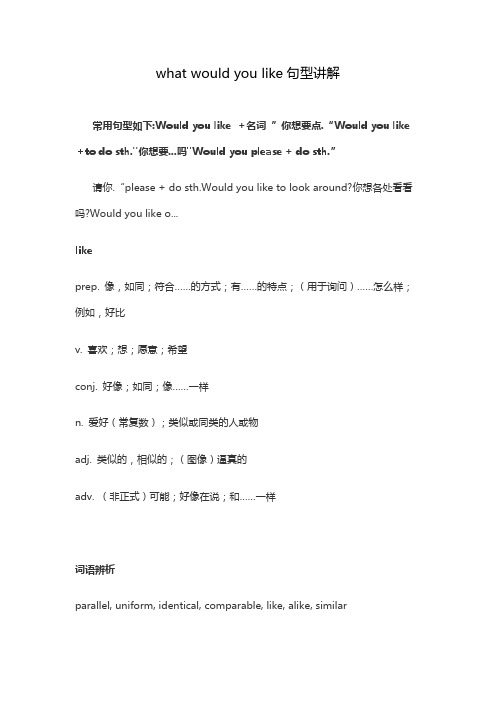
what would you like句型讲解常用句型如下:Would you like +名词”你想要点.“Would you like +to do sth."你想要...吗"Would you please + do sth.”请你.“please + do sth.Would you like to look around?你想各处看看吗?Would you like o...likeprep. 像,如同;符合……的方式;有……的特点;(用于询问)……怎么样;例如,好比v. 喜欢;想;愿意;希望conj. 好像;如同;像……一样n. 爱好(常复数);类似或同类的人或物adj. 类似的,相似的;(图像)逼真的adv. (非正式)可能;好像在说;和……一样词语辨析parallel, uniform, identical, comparable, like, alike, similar这组词都有“相似的,类似的”的意思,其区别是:parallel 主要指在外表或在性质上相似到有可以相提并论的程度。
uniform 指在性质、数量、形态或程度等方面相似到很难看出差异的地步。
identical 语气最强,可指同一个人或物,也可指数个人或物之间完全没有差别。
comparable 指在某一点或几点上有相似之处,可作有限或粗略的对比,尤指在价值或能力等方面可相提并论。
like 普通用词,含义广泛,指多个或全部特性都相似,但并非同一个,也可指在某个特殊的偶然相似。
alike 指事物在性质、特征或外貌上固有的而不是偶然的相似。
普通用词,只作表语。
similar 强调不同的人或事物之间完全或部分相似,暗示可暂不考虑或无视其差异之处。
情态动词经典例题
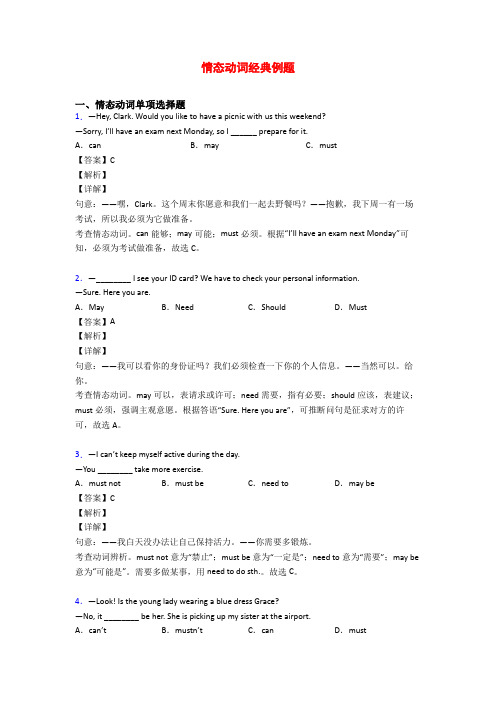
情态动词经典例题一、情态动词单项选择题1.—Hey, Clark. Would you like to have a picnic with us this weekend?—Sorry, I’ll have an exam next Monday, so I ______ prepare for it.A.can B.may C.must【答案】C【解析】【详解】句意:——嘿,Clark。
这个周末你愿意和我们一起去野餐吗?——抱歉,我下周一有一场考试,所以我必须为它做准备。
考查情态动词。
can能够;may可能;must必须。
根据“I’ll have an exam next Monday”可知,必须为考试做准备,故选C。
2.—________ I see your ID card? We have to check your personal information.—Sure. Here you are.A.May B.Need C.Should D.Must【答案】A【解析】【详解】句意:——我可以看你的身份证吗?我们必须检查一下你的个人信息。
——当然可以。
给你。
考查情态动词。
may可以,表请求或许可;need需要,指有必要;should应该,表建议;must必须,强调主观意愿。
根据答语“Sure. Here you are”,可推断问句是征求对方的许可,故选A。
3.—I can’t keep myself active during the day.—You ________ take more exercise.A.must not B.must be C.need to D.may be【答案】C【解析】【详解】句意:——我白天没办法让自己保持活力。
——你需要多锻炼。
考查动词辨析。
must not意为“禁止”;must be意为“一定是”;need to意为“需要”;may be 意为“可能是”。
would的用法及句型
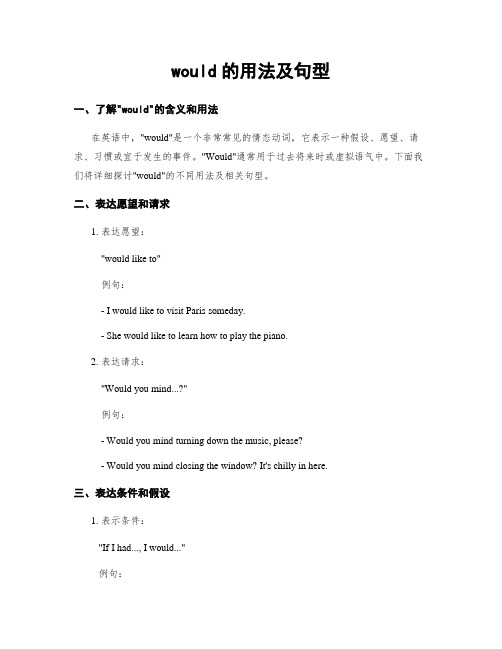
would的用法及句型一、了解"would"的含义和用法在英语中,"would"是一个非常常见的情态动词,它表示一种假设、愿望、请求、习惯或宜于发生的事件。
"Would"通常用于过去将来时或虚拟语气中。
下面我们将详细探讨"would"的不同用法及相关句型。
二、表达愿望和请求1. 表达愿望:"would like to"例句:- I would like to visit Paris someday.- She would like to learn how to play the piano.2. 表达请求:"Would you mind...?"例句:- Would you mind turning down the music, please?- Would you mind closing the window? It's chilly in here.三、表达条件和假设1. 表示条件:"If I had..., I would..."例句:- If I had a car, I would drive to work instead of taking the bus.- If it rained tomorrow, we would cancel our picnic plan.2. 虚拟语气(与现实相反的情况):"If I were..., I would..."例句:- If I were rich, I would travel around the world.- If my parents allowed me, I would go to the party tonight.四、描述习惯和经常发生的事情1. 描述习惯性行为(过去经常发生):"Used to"例句:- I used to live in New York, but now I live in London.- They used to go camping every summer when they were children.2. 描述过去经常发生的动作:"Would" + 动词原形例句:- Every morning, he would wake up early and go for a run.- When we were students, we would often study together at the library.五、其他常用句型1. 表达客气或征求意见:"Would you like...?"例句:- Would you like a cup of tea?- Would you like me to help you with your luggage?2. 提出建议:"I would suggest/recommend that..."例句:- I would suggest that you take some time off and relax.- I would recommend that she see a doctor about her back pain.六、总结通过学习"would"的不同用法和常见句型,我们能够更准确地表达愿望、请求、条件、假设以及描述习惯和经常发生的事情。
Would you like to...否定回答句型操练PPT课件

Would you like to have more
some carrots?
No, thanks.
你想要…吗?
Would you like to +动作 肯定回答:Yes,I'd love to. 否定回答:No,Thank you.
你想要干什么? What would you like to do?
What would you like to drink? No.Thank you.
Would you like some green tea ?
No. Thank you.
Would you like to go skating with us?
No. Thank you.
Would you like to drink some milk? No. Thank you.
批注本地保存成功开通会员云端永久保存去开通
Would you like to …? 否定回答句型操练
Would you like to come to my room? 你想要来我的房间吗? No, thank you. 不用了, 谢谢。
Would you like to have some water? 你想要去喝点水吗? No, thank you. 不用了, 谢谢。
你想去打篮球吗?
Would you like to play basketball?
不了,谢谢。
No. Thank you.
写在最后
经常不断地学习,你就什么都知道。你知道得越多,你就越有力量 Study Constantly, And You Will Know Everything. The More
You Know, The More Powerful You Will Be
七年级英语上册U4T2SCWould you like to cook with us

4.某人随身携带某物
4. take sth with sb
5.那真是太好了。
5. That would be very nice.
6.我最喜爱的食物是鱼。 6. My favorite food is fish.
7. 我想随身带一些面包。 7. I want/would like to take
some bread with me.
A. I’m free.
B. I have time.
C. I have no time.
D. I have some time.
7. —Please ask Jane _C___. —Sure.
A. call me
B. give me a call
C. to call me back
D. to call back me
go out. 4. have a picnic/go for a picnic 去野炊
自学指导4
1、自学内容:课本93、94页中表示请求、建 议和征询对方建议的句子
2、自学方法:通过例句总结句型 3、自学时间:5分钟 4、自学要求:自己归纳、小组讨论后总结出
其句型。
自学检测6
表示邀请、建议、征求对方建议的句型:
My favorite food is fish.
I want to take some bread.
We are very happy!
1. He is not happy.
2. He wants to have a picnic with his friends.
3. Some hamburgers, bananas, bread and fish with them. 4. Yes, they are.
like to的用法
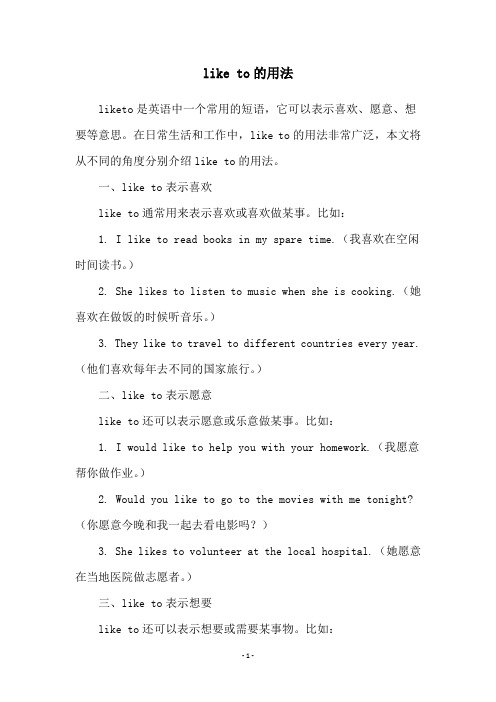
like to的用法liketo是英语中一个常用的短语,它可以表示喜欢、愿意、想要等意思。
在日常生活和工作中,like to的用法非常广泛,本文将从不同的角度分别介绍like to的用法。
一、like to表示喜欢like to通常用来表示喜欢或喜欢做某事。
比如:1. I like to read books in my spare time.(我喜欢在空闲时间读书。
)2. She likes to listen to music when she is cooking.(她喜欢在做饭的时候听音乐。
)3. They like to travel to different countries every year.(他们喜欢每年去不同的国家旅行。
)二、like to表示愿意like to还可以表示愿意或乐意做某事。
比如:1. I would like to help you with your homework.(我愿意帮你做作业。
)2. Would you like to go to the movies with me tonight?(你愿意今晚和我一起去看电影吗?)3. She likes to volunteer at the local hospital.(她愿意在当地医院做志愿者。
)三、like to表示想要like to还可以表示想要或需要某事物。
比如:1. I would like to have a cup of coffee, please.(我想要一杯咖啡,谢谢。
)2. He likes to have a good breakfast every morning.(他每天早上都想要吃一顿好的早餐。
)3. They like to have a comfortable bed to sleep in.(他们想要一张舒适的床来睡觉。
)四、like to的其他用法除了以上几种用法外,like to还有其他一些用法。
